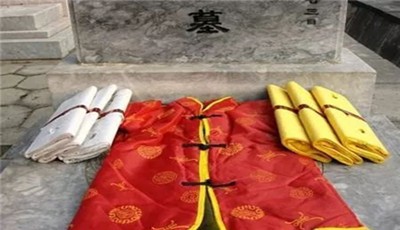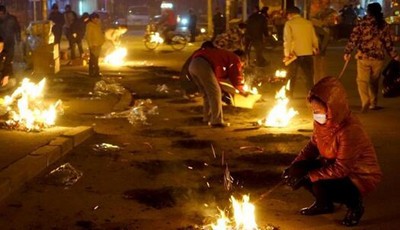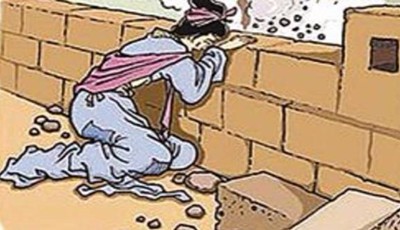Hanyi Festival (Winter Clothing Festival)
 The Hanyi Festival (寒衣节), also known as the Winter Clothing Festival, is a traditional worship festival in China, which falls on the first day of the tenth lunar month and is said to originate from the Zhou Dynasty (1100-221 BC). According to the Chinese lunar calendar, the first day of the tenth lunar month marks the beginning of the cold winter, and clothes made of cloth or paper should be incinerated on the day in order to protect the ancestors against the particularly cold weather of winter in the underworld. This is the so-called “Hanyi Festival” (The Winter Clothing Festival). In the Chinese folk culture, the Hanyi Festival (the Winter Clothing Festival), the Qingming Festival (the Tomb Sweeping Day) and the Zhongyuan Festival are collectively referred to as the three “ghost festivals” in China. On the first day of the tenth lunar month, the Chinese folks burn the winter clothes made of paper or cloth in memory of the deceased ancestors, showing the compassion of the living for the deceased. Meanwhile, this day also marks the arrival of the severe cold winter. So, it is also a day for parents, lovers and others to give warm clothes to those who they care about.
The Hanyi Festival (寒衣节), also known as the Winter Clothing Festival, is a traditional worship festival in China, which falls on the first day of the tenth lunar month and is said to originate from the Zhou Dynasty (1100-221 BC). According to the Chinese lunar calendar, the first day of the tenth lunar month marks the beginning of the cold winter, and clothes made of cloth or paper should be incinerated on the day in order to protect the ancestors against the particularly cold weather of winter in the underworld. This is the so-called “Hanyi Festival” (The Winter Clothing Festival). In the Chinese folk culture, the Hanyi Festival (the Winter Clothing Festival), the Qingming Festival (the Tomb Sweeping Day) and the Zhongyuan Festival are collectively referred to as the three “ghost festivals” in China. On the first day of the tenth lunar month, the Chinese folks burn the winter clothes made of paper or cloth in memory of the deceased ancestors, showing the compassion of the living for the deceased. Meanwhile, this day also marks the arrival of the severe cold winter. So, it is also a day for parents, lovers and others to give warm clothes to those who they care about.Dates of Hanyi Festival
The Hanyi Festival falls on the first day of the tenth lunar month (usually in November in Gregorian Calendar). The following chart shows the exact times for the festival from 2023 to 2025 in Gregorian Calendar:
| Year | Date of Hanyi Festival |
|---|---|
| 2023 | November 13th |
| 2024 | November 1st |
| 2025 | November 20th |
Origin
According to ancient records, during the pre-Qin period (2,100 B.C.-221 B.C), on this day, the emperors led the three minsters and nine secretaries to the northern suburbs to hold a ceremony to welcome the winter. When they returned after the ceremony, they would reward those who had died for the country, and compensate their wives and children. How were those who had already died to be rewarded? “Sending winter clothes” to protect them against the winter in the underworld was the right thing to do in honor of them, and the practice was followed generation after generation.
Customs
 Burning of Winter Clothing
Burning of Winter Clothing
On this day of the “Winter Clothing Festival”, people will sacrifice and burn offerings in memory of their deceased relatives. When offering sacrifices, in addition to the usual offerings of food, incense, candles and paper money, there is also an indispensable offering, which is paper-made or cloth-made clothes for the deceased. During the rituals, the clothes are incinerated and given to the ancestors, which is called “sending winter clothes”.
Preparation of Offerings
This is usually done in the morning. After the offerings have been made, the family sends the children to the street to buy some five-colored paper, coins and incense foil. The five colors of paper are red, yellow, blue, white and black, and are thin, some with cotton in between. After eating at noon, the housewife cleans up the pot and calls the family together so that they can go to the grave to burn the winter clothes made for the deceased.
 Worship
Worship
When they arrive at the grave, they burn incense and light wax, place dumplings and other offerings, and the family takes turns to kneel and kowtow; then they draw a circle around the grave, place multicolored paper and coins inside the circle, and light it on fire. Some families not only burn the coins, but also luxury items such as mansions and cars made of multicolored paper, and while burning, they chant: "So and so, you worked so hard while you were alive, but when you're dead, you'll enjoy yourself, live in a mansion, drive a BMW, have a great time, and make the king of Hades jealous and mad!" They are afraid that their loved ones will not have a good life in the underworld. In some cases, when a circle is drawn on the grave, another circle is added next to it. The intention is to provide relief to the orphaned spirits who have no one to pay their homage to, so that they will not be so poor as to steal the clothes of their ancestors. In some places, the burning of winter clothes is done in front of the grave of the deceased, before the sun rises. In some places, it is customary to burn offerings in front of the door. In many places north of the Yan (Hebei Province) and in counties such as Pingyao in Jinzhong, Shanxi Province, women are expected to weep loudly outside their doors in the evening.
Food Customs
On the first day of the tenth lunar month, not only do people give winter clothes to the deceased, but the living also performs some traditional activities that symbolize the winter. People usually eat a bowl of nutritious noodles, dumplings or red beans and rice to celebrate the Hanyi (Winter Clothing) Festival.
Other Customs
In some parts of the country, on the first day of the tenth lunar month, not only are winter clothes given to the deceased for the winter, but the living also performs traditional activities to symbolize the winter. On this day, women bring out the cotton clothes they have made for their children and husbands to change into fit for the season. If it is still too warm to wear cotton, they urge their children and husbands to try them on for good luck. On this day, men are used to fixing the fireplace and the chimney pipe. Once installed, they also try to start a fire to ensure smooth heating when the weather is cold. Women are not allowed to travel on the first day of the tenth lunar month.
Taboos
1. All clothing and money given to the deceased must be burned, and only when they are burned cleanly and completely can the paper of the Yang(living) world be transformed into silk and cloth, clothing and bedding and gold, silver and copper coins of the (Hades) underworld. As long as a little bit of the paper is not burnt, all previous efforts will be in vain and the deceased will not be able to use it. Therefore, the burning of winter clothes on the first day of the tenth lunar month must be done with special care and attention.
2. When giving away winter clothes, it is also customary to burn some five-colored paper at the crossroads, symbolizing cloth and silk. The intention is to provide relief to the orphaned souls of those families who have no one to worship their ancestors, so that they do not rob their loved ones of the winter supplies they have sent to their relatives.
Legends
 As an important component of folklore, traditional festivals have their own historical background. One of its manifestations is the stories and legends. These stories and legends give an account of the origins of the festivals and enable the people to understand the connotations of the festivals and customs in an easy-to-understand way, thus perpetuating the festivals and customs. On the first day of the tenth lunar month, winter clothes were sent. On earth, who sent the clothes? Whom was the colothes sent to in the earliest days? The stories and legends give an account of this. → Legends of Hanyi Festival
As an important component of folklore, traditional festivals have their own historical background. One of its manifestations is the stories and legends. These stories and legends give an account of the origins of the festivals and enable the people to understand the connotations of the festivals and customs in an easy-to-understand way, thus perpetuating the festivals and customs. On the first day of the tenth lunar month, winter clothes were sent. On earth, who sent the clothes? Whom was the colothes sent to in the earliest days? The stories and legends give an account of this. → Legends of Hanyi Festival
Chinese Calendar
| Su | Mo | Tu | We | Th | Fr | Sa |
|---|---|---|---|---|---|---|
| 26十四/14 | 27十五/15 | 28十六/16 | 29十七/17 | 30十八/18 | 1十九/19 | 2二十/20 |
| 3廿壹/21 | 4廿二/22 | 5廿三/23 | 6廿四/24 | 7廿五/25 | 8廿六/26 | 9廿七/27 |
| 10廿八/28 | 11廿九/29 | 12三十/30 | 十壹月 (Nov) 13初壹/1 | 14初二/2 | 15初三/3 | 16初四/4 |
| 17初五/5 | 18初六/6 | 19初七/7 | 20初八/8 | 21初九/9 | 22初十/10 | 23十壹/11 |
| 24十二/12 | 25十三/13 | 26十四/14 | 27十五/15 | 28十六/16 | 29十七/17 | 30十八/18 |
| 31十九/19 | 1二十/20 | 2廿壹/21 | 3廿二/22 | 4廿三/23 | 5廿四/24 | 6廿五/25 |
{{week}}. {{month}} {{day}}, {{year}}
Lunar Date
{{lmonth}} {{lday}}, {{syear}} ({{zodiac}}) Year ({{lyear}}){{sday}} Day, {{smonth}} Month
Clash {{clash}} | Evil {{evil}}
Auspicious
-
{{#luckly}}
- {{.}} {{/luckly}}
Inauspicious
-
{{#unluckly}}
- {{.}} {{/unluckly}}
Auspicious Times
-
{{#luckyTime}}
- {{.}} {{/luckyTime}}
Lastest Questions and Answers
Wedding in 3rd Lunar Month 2023 (1 Reply ) Asked by J***e | 6/20/2022 5:56:37 AM
Have been told to avoid wedding in the 3rd Lunar Month due to Qing Ming festival. However, in the year 2023, Qing Ming Festival is held in Lunar...
BaZi Balancing (0 Reply ) Asked by J***s | 6/12/2022 8:41:55 PM
(me) Earth: 15, (fame) Metal: 0, (money) Water: 70, (career) Wood: 280, (parents) Fire: 90 I am looking for the best remedies for these BaZi scores....
Chinese New Year is way more interesting than Christmas-not a question (0 Reply ) Asked by D***n | 1/5/2021 5:23:25 PM
You are not a western person, why are you biased towards the wrong side? You need to fix your website to admit that Spring Festival is celebrated on...
Very Weak Bazi (2 Replies ) Asked by V***n | 4/21/2020 5:44:13 AM
Hi, I was born on a winter solstice and seems to have a very weak BaZi/Very strong water element in my life. I am normally soon emigrating to China...
For hotel business which day is the best day to do the ghost festival praying (1 Reply ) Asked by C*** | 8/7/2019 2:00:59 AM
What things need to prepare for the ghost festival praying
